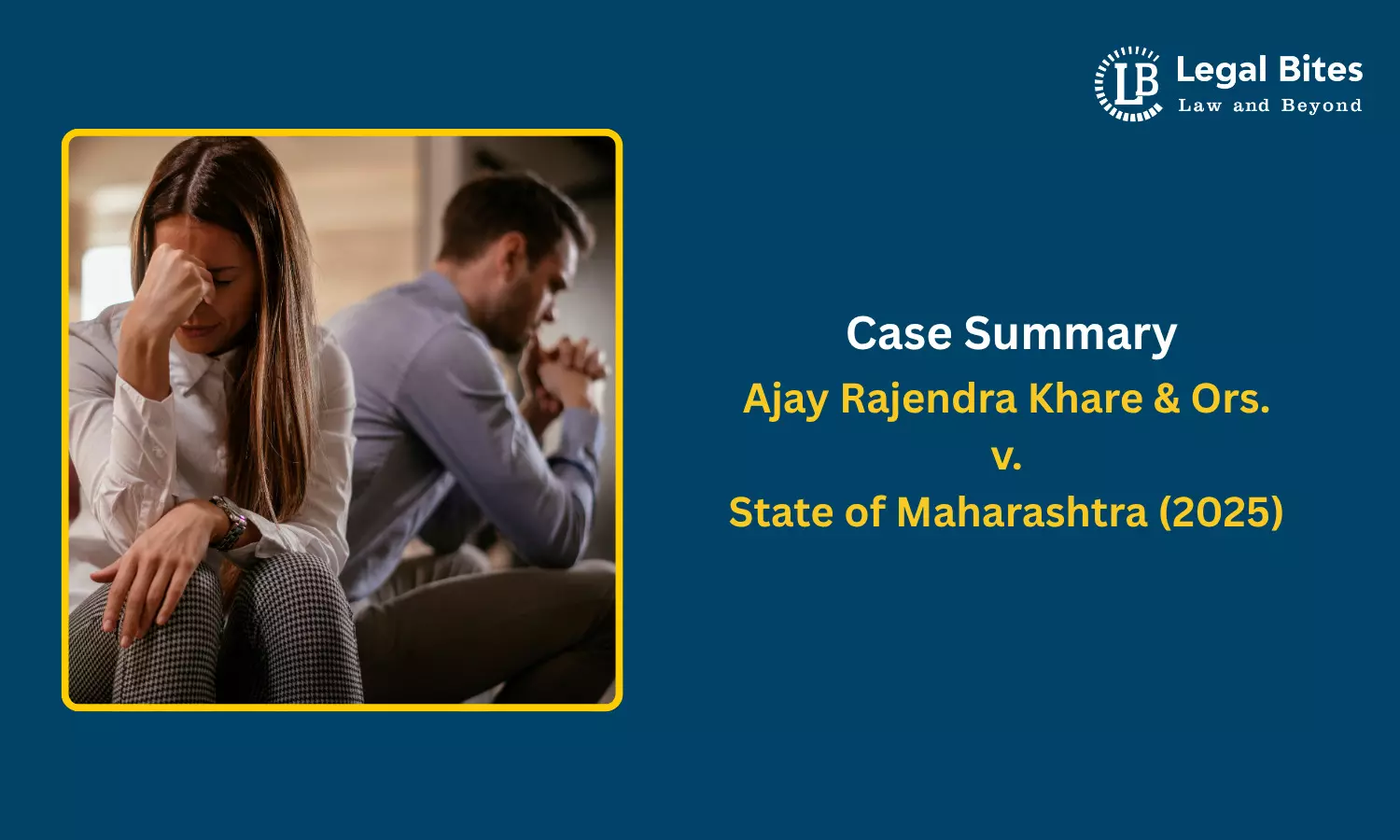Case Summary: Ajay Rajendra Khare & Ors. v. State of Maharashtra (2025) | Abuse of Criminal Law in Matrimonial Matters
In a major 2025 ruling, the Bombay High Court quashed a dowry harassment FIR, citing abuse of process in matrimonial matters. Read the detailed case summary.

This case revolves around a matrimonial dispute culminating in the filing of an FIR under Sections 498A, 323, 504, and 506 read with Section 34 of the Indian Penal Code, 1860. The petitioners, comprising the husband, in-laws, and extended family members of the complainant-wife, sought quashing of criminal proceedings initiated against them.
The Bombay High Court, after scrutinising the facts, charge sheet, and procedural lapses, ruled in favour of quashing the FIR and proceedings, citing misuse of Section 498A IPC and lack of genuine evidence.
Court: Bombay High Court, Aurangabad Bench
Case Title: Ajay Rajendra Khare and Others v. The State of Maharashtra and Others
Case Number: Criminal Application No. 53 of 2025
Coram: Hon’ble Smt. Vibha Kankanwadi & Sanjay A. Deshmukh, JJ.
Date of Judgment: 10th June 2025
Background of the Dispute
The marriage between Applicant No. 1, Ajay Rajendra Khare, and Respondent No. 3, Dr. Sandhya Ashok Kadam (now Khare), was solemnised on 28 January 2024. The allegations arose shortly thereafter, with the FIR being lodged on 31 July 2024 at Vimantal Police Station, Nanded. The FIR named six applicants (husband, parents-in-law, sister-in-law and her husband, and a cousin) as accused and alleged acts of cruelty and dowry harassment.
Key Allegations by the Complainant (Respondent No. 3):
Physical and mental harassment
- Demand for ₹20,00,000 dowry
- Verbal abuse and threats
- Being starved and humiliated
- Being forcibly sent to her parental home after two months
Applicants’ Defence and Grounds for Quashing
The applicants, through Advocate Mrs. Rashmi S. Kulkarni, raised several arguments challenging the legitimacy and veracity of the FIR and the subsequent criminal proceedings.
1) Short Duration of Matrimonial Cohabitation
- The complainant lived with Applicant No. 1 (husband) for only 40 days.
- After marriage, she visited her parental home, went on a honeymoon to Manali from 12 to 17 February 2024, and later returned for a short period before the alleged desertion on 28 March 2024.
2) False and Vague Allegations
- Allegations of cruelty were general and lacked specific details.
- The complainant accused even distant relatives (e.g., cousin brother) who had minimal interaction with her.
3) Suppression of Employment Details
- The complainant was employed as a Senior Executive in MD India Health Insurance TPA Pvt. Ltd., Pune.
- She misrepresented herself as a housewife both in FIR and witness statements.
4) Supporting Documents Produced
- RTI response from Kharghar Police Station showed that the complainant initially did not wish to lodge a complaint.
- Railway tickets and hotel bookings for the Manali honeymoon trip, booked under her maiden name, were produced to show cordial relations post-marriage.
5) Improper Investigation
- No investigation conducted at the alleged places of cruelty (Kharghar and Manmad).
- Police only recorded statements of the complainant's family, which were copy-pasted and repetitive.
Legal Precedents Cited
Mohammad Wajid & Ors. v. State of Uttar Pradesh, AIR 2023 SC 3784
The Court emphasised that when FIRs appear manifestly frivolous or motivated by vengeance, the Court must look beyond the pleadings and consider surrounding circumstances. FIRs drafted with ulterior motives may appear factually sound, but the Court must evaluate the entire case record for fairness.
“In frivolous or vexatious proceedings, the Court owes a duty to look into many other attending circumstances... and read in between the lines.”
Respondent's (Complainant’s) Submissions
Advocate for the complainant argued:
- The charge sheet included sufficient material to proceed to trial.
- Specific instances of cruelty and dowry demands were alleged.
- Short cohabitation period should not be a ground to quash proceedings if harassment was grave.
- A large sum (₹25,00,000) was spent on marriage, followed by dowry demands of ₹20,00,000.
Court’s Observations
The Court made scathing remarks on the misuse of Section 498A IPC and the mechanical nature of the investigation:
Lack of Credibility in Allegations
- Court found it implausible that serious dowry demands and threats of murder could occur within two days of the couple reaching Mumbai.
- The statements lacked specificity and appeared exaggerated.
- The conduct of the complainant in hiding her professional background was held against her.
Inconsistent Statements
- The complainant gave the impression that applicants 4 and 5 resided near the matrimonial home at Manmad, when in fact they lived and worked in Navi Mumbai.
- This misrepresentation showed an intention to falsely implicate.
Police Lapses
- Investigation did not include visits to the actual locations of alleged cruelty.
- Panchnama was drawn at the complainant’s father’s house rather than the matrimonial home.
- The investigating officer exhibited a casual and prejudiced approach.
“Nowadays even the police are not taking proper precautions and making appropriate investigation when it comes to offence under Section 498-A... this attitude is dangerous because genuine cases would suffer.”
Findings of the Court
After examining the FIR, charge sheet, statements of witnesses, RTI replies, and circumstantial records, the Court concluded:
- The complaint appeared to be lodged with mala fide intentions.
- There was a clear abuse of the criminal process under Section 498A IPC.
- No prima facie case was made out against several of the accused family members.
- The materials suggested the misuse of the legal process to harass the applicants.
Decision
Final Order (Quashing of FIR and Proceedings)
The Court invoked its powers under Section 482 CrPC to prevent miscarriage of justice and quashed:
- FIR No. 291/2024 dated 31.07.2024
- Regular Criminal Case No. 1306/2024 pending before JMFC, Nanded
Applicants discharged:
- Ajay Rajendra Khare (husband)
- Mrs. Shobha Rajendra Khare (mother-in-law)
- Rajendra Madhavrao Khare (father-in-law)
- Mrs. Pratiksha Pawar (sister-in-law)
- Pramod Pawar (sister-in-law's husband)
- Sumant Ramesh Khare (cousin brother)
Significance and Commentary
This judgment is a significant precedent in matrimonial litigation, especially under Section 498A IPC. It reiterates the necessity for courts to:
- Examine contextual background and supporting documents, not just FIR allegations.
- Prevent the mechanical prosecution of innocent relatives who may have no role in the marital discord.
- Hold police accountable for non-serious investigations in sensitive matters.
Key Takeaways:
- Section 498A IPC (Section 84 BNS) must not be treated as a tool of vengeance.
- Courts must exercise vigilant scrutiny in FIR quashing petitions.
- False implication of distant relatives can be a ground for quashing.
- Suppression of material facts by the complainant undermines her credibility.
Click Here to Read the Official Judgment
Conclusion
The Bombay High Court in Ajay Rajendra Khare & Ors. v. State of Maharashtra sent a strong message against the misuse of matrimonial cruelty provisions under IPC (now BNS).
While acknowledging the genuine plight of many women, it underscored that fairness must prevail on both sides. The ruling serves as a cautionary tale for complainants and investigating agencies alike and reinforces the principle that justice must not only be done but must also be seen to be done.

